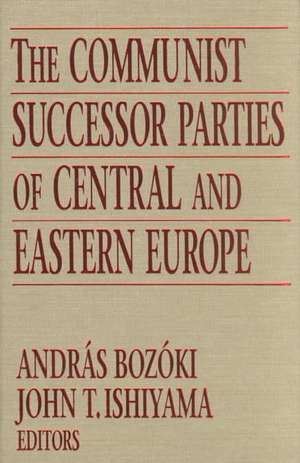The Communist Successor Parties of Central and Eastern Europe
Autor Andras Bozoki, John T. Ishiyamaen Limba Engleză Hardback – 31 iul 2002
Preț: 764.20 lei
Preț vechi: 1027.40 lei
-26% Nou
Puncte Express: 1146
Preț estimativ în valută:
146.25€ • 152.49$ • 121.54£
146.25€ • 152.49$ • 121.54£
Carte tipărită la comandă
Livrare economică 20 martie-03 aprilie
Preluare comenzi: 021 569.72.76
Specificații
ISBN-13: 9780765609861
ISBN-10: 076560986X
Pagini: 522
Dimensiuni: 152 x 229 x 34 mm
Greutate: 0.45 kg
Ediția:1
Editura: Taylor & Francis
Colecția Routledge
Locul publicării:Oxford, United Kingdom
ISBN-10: 076560986X
Pagini: 522
Dimensiuni: 152 x 229 x 34 mm
Greutate: 0.45 kg
Ediția:1
Editura: Taylor & Francis
Colecția Routledge
Locul publicării:Oxford, United Kingdom
Cuprins
List of Tables and Figures About the Editors and Contributors -- Part I: Approaches -- 1. Introduction and Theoretical Framework /Andras Bozoki and John T. Ishiyama -- 2. Constraints and Opportunities in the Strategic Conduct of Post-Communist Successor Parties Regime Legacies as Causal Argument /Herbert Kitschelt -- 3. Prospects and Limits of New Social Democracy in the Transitional Societies of Central Europe /Janos Ladanyi and Ivan Szelenyi -- Part II: Case Studies -- 4. The Polish SLD in the 1990s -- From Opposition to Incumbents and Back /Radoslaw Markowski -- 5. The Hungarian Socialists -- Technocratic Modemizationism or New Social Democracy? /Andras Bozoki -- 6. The Troubled Evolution of Slovakia’s Ex-Communists /Sharon Fisher -- 7. The Communist Party of Bohemia and Moravia after 1989 -- “Subcultural Party” to Neocommunist Force? /Sean Hanle -- 8. The PDS -- Regional Party or a Second Social-Democratic Party in Germany? /Dieter Segert -- 9. The Romanian Postcommunist Parties -- A Story of Success /Alina Mungiu-Pippidi -- 10. The Yugoslav “Left” Parties -- Continuities of Communist Tradition in the Milosevic Era /Srbobran Brankovic -- 11. The Metamorphosis of the Communist Party of Lithuania /Diana Janusauskiene -- 12. The Russian KPRF -- The Powerlessness of the Powerful /Richard Sakwa -- Part III: Theoretical and Comparative Considerations -- 13. A Topology of Communist Successor Parties -- An Overview /John T. Ishiyama -- 14. Doomed to be Radicals? -- Organization, Ideology, and the Communist Successor Parties in East Central Europe /Daniel F. Ziblatt and Nick Biziouras -- 15. The Return of the Left and Democratic Consolidation in Poland and Hungary /Valerie Bunce -- 16. The Effects of Communist Party Transformation on the Institutionalization of Party Systems /Anna Grzymala-Busse -- 17. Changing Cleavage Structure and the Communist Successor Parties of the Visegrad Countries /Michael Bauer -- 18. Mainstreaming Extremism -- The Romanian PDSR and the Bulgarian Socialists in Comparative Perspective /Jeffrey Stevenson Murer -- 19. Organizational Strength Divorced from Power -- Comparing the Communist Parties of the Russian Federation and Ukraine /Barbara Ann Chotiner -- 20. An Unfinished Story -- Toward Explaining the Transformation of the Communist Successor Parties /John T. Ishiyama and Andras Bozoki -- Bibliography -- Appendix 1 -- Appendix 2 -- Index.
Notă biografică
Andras Bozoki is associate professor of political science at Central European University, Budapest, Hungary. His main fields of research are comparative politics, democratization, political ideas, and political and cultural elites. His publications include three books in Hungarian, and Post Communist Transition: Emerging Pluralism in Hungary (1992) (co-editor); Lawful Revolution in Hungary, 1989-94 (1995) (co-editor); Intellectuals and Politics in Central Europe (1999) (editor); and The Roundtable Talks of 1989: The Genesis of Hungarian Democracy (2002) (editor). John T. lshiyama is associate professor of political science at Truman State University, Kirksville, MO. His main fields of research are post-communist party politics, institutional development, and ethnic politics in Eastern Europe and the former Soviet Union. His recent books include Ethnopolitics in the New Europe (1998) (co-author) and Communist Successor Parties in Post Communist Politics (1999) (editor). He has also published numerous journal articles on post-communist politics.
Descriere
What has become of the Communist parties that once held monopoly power in the east bloc? A decade ago it was assumed that they would dissolve, but many of them have enjoyed electoral success. This book systemtically exmaines how they have evolved.
